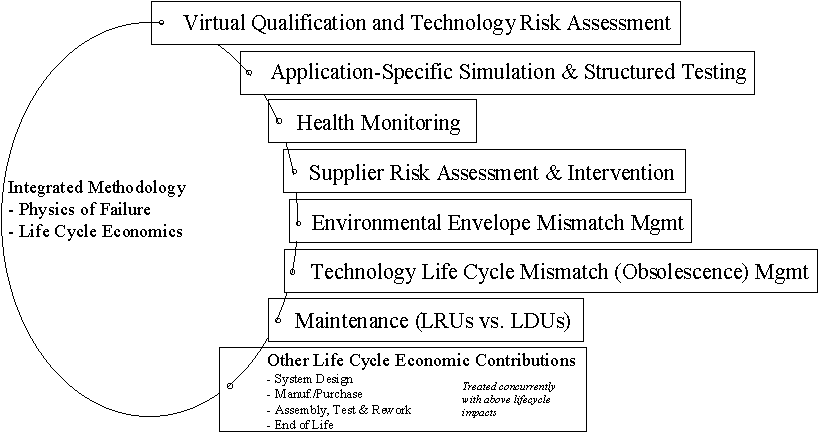
Physics of Failure Approach to Sustainable Electronic Systems (PASES)
A program entitled "Life Cycle Cost Reduction Through a Cradle-to-Grave Physics of Failure Approach to Sustainable Electronic Systems," has been selected for award by the Air Force ManTech program at Wright-Patterson Air Force Base under BAA 98-16. The 51 month program, expected to start in the second quarter of 1999, was developed by a team composed of CALCE, AlliedSignal, Price Systems, and the F-16 System Program Office. Working together, the team will dramatically decrease life cycle costs by managing life cycle risks associated with the design and manufacturing of sustainable military electronic systems. The approach taken in this program is not making old technology parts available longer, or making the maintenance of systems less expensive, but rather, to focus on designing and manufacturing systems for the defense industry that have lower life cycle sustainment costs, by instituting a cradle-to-grave Physics of Failure (PoF) based program as an up-front (pro-active) approach to achieving system reliability, manufacturability, technology risk management, and affordability. Methodologies addressed within this program are shown in Figure 1:

Figure 1 - PASES approach.
In addition to developing and implementing the above methodologies, this program will identify new metrics to better assess risk and use them to characterize economic impact models for the new methodologies. The economic models will be integrated with other contributions to the life cycle, to form a complete life cycle cost analysis. Implementation of the life cycle cost modeling will leverage off commercial software tools from Price Systems. Use of this existing software greatly reduces the required effort and risk in successfully delivering a useful economic analysis solution integrate with PoF in this program.
To facilitate a high-impact prototype implementation, this program will leverage off AlliedSignal's Adaptive Military APU Control (AMAC) program. The AMAC program has aggressive goals including a significant reduction in development cycle time for follow-on applications, increased reliability and reduced recurring and non-recurring costs. Associated with the AMAC program, AlliedSignal will perform a prototype implementation on electronic controls for Auxiliary Power Units used in F-16, F-18 and Army helicopters. This implementation will be used to measure the effectiveness of the methodologies and their implementation in the design and manufacturing process.
For further information on this program, contact Dr. Peter Sandborn, (301) 405-3167, sandborn@calce.umd.edu.